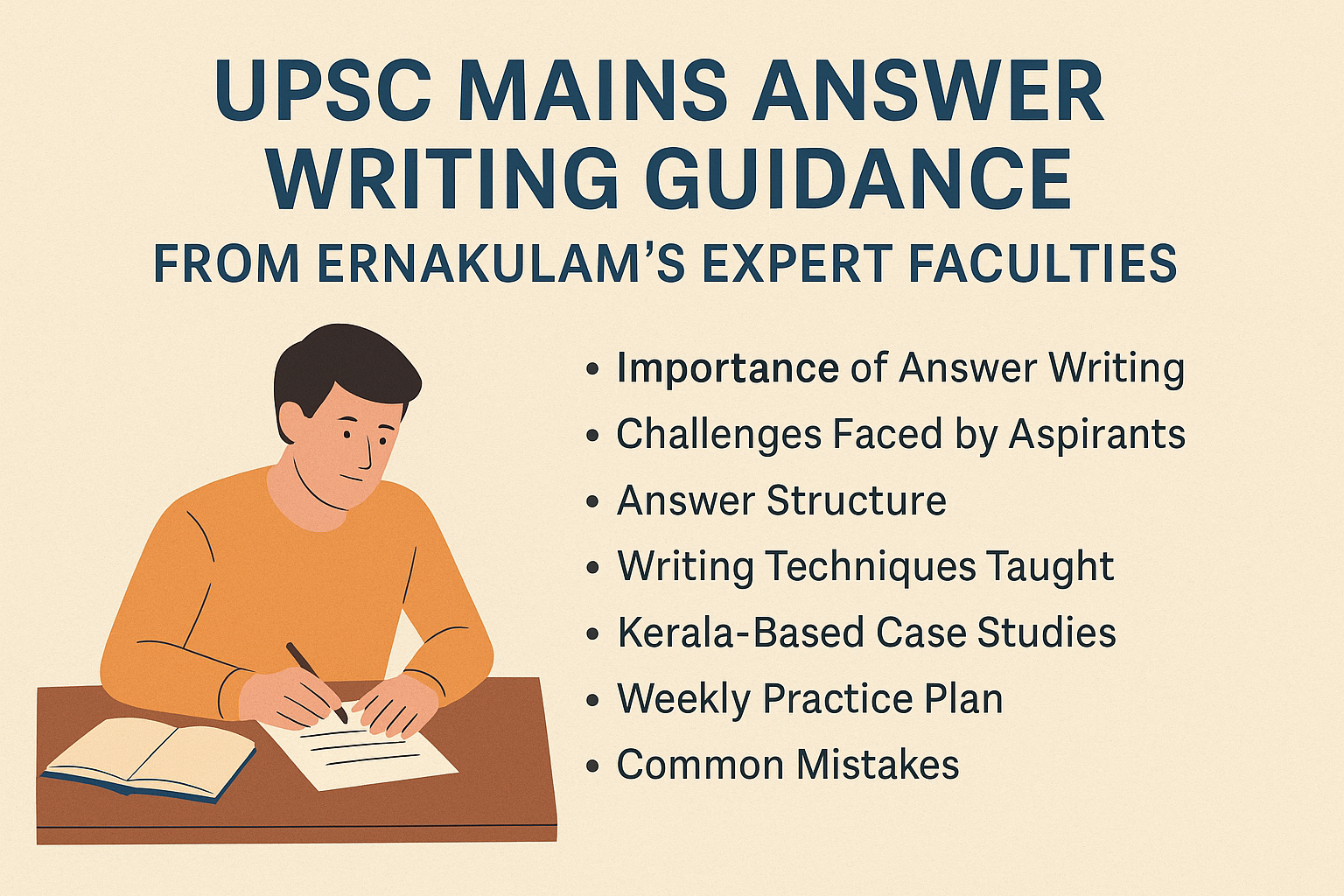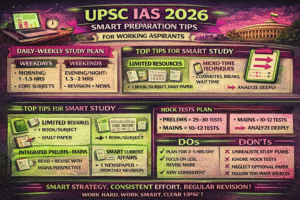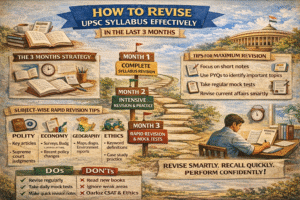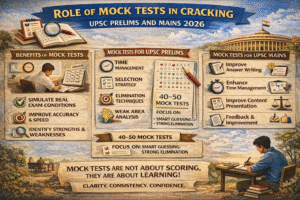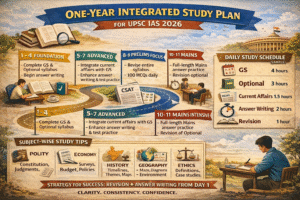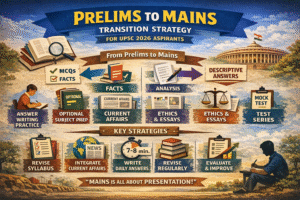The UPSC Mains examination is a test of analytical clarity, articulation, and time-bound expression. While knowledge forms the foundation, the ability to present it effectively through structured and concise writing determines success. Aspirants in Ernakulam benefit immensely from expert faculties who specialize in guiding students to write answers that meet UPSC’s evaluation standards.
Importance of Answer Writing in UPSC Mains
UPSC Mains is designed to evaluate not just how much you know but how you apply and communicate that knowledge. It tests three core skills:
Conceptual Understanding – Identifying the demand of the question.
Analytical Ability – Linking causes, effects, and solutions.
Effective Presentation – Writing answers that are well-structured, concise, and impactful.
Even well-prepared aspirants struggle if their answers lack structure or clarity. Expert guidance from experienced mentors helps bridge this gap through regular writing practice, evaluation, and feedback.
Challenges Faced by Aspirants
Inability to structure answers logically.
Lack of clarity in identifying the core demand of the question.
Overwriting or missing key points due to poor time management.
Inadequate use of examples, data, and current affairs.
Weak conclusions that fail to provide a way forward.
Ernakulam-based faculties address these challenges with personalized guidance, structured mock tests, and feedback-driven writing improvement.
Key Features of Answer Writing Coaching in Ernakulam
Individual Feedback System: Each answer is evaluated line-by-line, highlighting strengths and areas of improvement.
Model Answer Discussion: Students learn how toppers structure introductions, arguments, and conclusions.
Weekly and Monthly Tests: Continuous practice ensures improvement in speed and content retention.
Kerala-Specific Examples: Real-life governance and environmental case studies from Kerala are used to enrich answers.
Time-Bound Writing Practice: Simulated tests help aspirants complete all questions within the allotted time.
Mentorship Sessions: One-on-one mentoring helps aspirants refine language, tone, and logical flow.
Ideal Structure of a UPSC Mains Answer
Introduction
Define the concept or provide a fact, report, or quote.
Set the context for the reader in 2–3 lines.
Body
Divide into 3–4 subheadings: causes, challenges, impacts, and solutions.
Use bullet points and include data, examples, and case studies.
Add flowcharts, diagrams, or maps wherever relevant.
Conclusion
Summarize with a positive and forward-looking statement.
Link with Sustainable Development Goals, constitutional principles, or ethical values.
Writing Techniques Taught by Expert Faculties
Decoding Keywords: Understanding question directives such as Discuss, Evaluate, Analyse, Examine.
Structured Writing: Using the IBC (Introduction–Body–Conclusion) format.
Data Enrichment: Using government reports like NITI Aayog, ARC, and Economic Survey.
Cross-Linking Topics: Connecting multiple papers, such as linking governance (GS-II) with ethics (GS-IV).
Ethical and Administrative Balance: Writing with a neutral and practical perspective.
Kerala-Based Case Studies for Enrichment
Governance: People’s Plan Campaign and Kudumbashree model.
Environment: Western Ghats biodiversity and Kerala flood management.
Society: Kerala’s literacy and healthcare achievements.
Ethics: Instances of integrity in Kerala’s public administration.
Economy: Blue Economy initiatives and cooperative sector reforms.
Subject-Wise Focus Areas for Mains Answer Writing
| Paper | Focus Areas | Writing Emphasis |
|---|---|---|
| GS Paper I | History, Society, Geography | Conceptual clarity with facts and maps. |
| GS Paper II | Polity, Governance, IR | Legal and constitutional references. |
| GS Paper III | Economy, Environment, Tech | Use of data, reports, and diagrams. |
| GS Paper IV | Ethics, Integrity, Aptitude | Logical reasoning and real-life examples. |
| Essay Paper | Interdisciplinary Topics | Coherent flow with quotes and examples. |
| Optional Papers | Public Administration, Geography, Sociology | Analytical writing with current relevance. |
Weekly Practice Plan
Monday: GS Paper I practice.
Wednesday: GS Paper II practice.
Friday: GS Paper III practice.
Sunday: Ethics or Essay test with mentor feedback.
Each test is followed by a faculty-led discussion and model answer analysis to ensure conceptual clarity and presentation improvement.
Common Mistakes and How to Avoid Them
| Mistake | Correction Strategy |
|---|---|
| Writing long introductions | Limit to 3 lines; directly address the question. |
| Lack of examples | Maintain a ready reference sheet with data and Kerala case studies. |
| Poor handwriting and structure | Practice 2-hour tests weekly with underlining and spacing. |
| Incomplete answers | Prioritize time-bound practice and question selection. |
| Weak conclusions | End with reforms, constitutional ideals, or vision statements. |
Value Addition Techniques
Use flowcharts and diagrams for clarity.
Quote reports like NITI Aayog, ARC, or RBI.
Use Kerala-specific schemes and case studies.
Add keywords such as transparency, accountability, inclusiveness, sustainability.
Maintain a quote bank for essays and ethics papers.
Benefits of Expert Coaching in Ernakulam
Structured and consistent writing practice.
Personal evaluation and improvement guidance.
Affordable access to experienced UPSC mentors.
Peer-based writing groups for discussion and feedback.
Exposure to Kerala-relevant issues for better contextual understanding.
30-Day Writing Improvement Plan
Week 1: Learn structure and analyse PYQs.
Week 2: Write short answers daily and get evaluated.
Week 3: Attempt full-length GS and Essay tests.
Week 4: Revise weak areas and repeat writing exercises.
This cycle builds consistency and enhances both content and time management skills.
Tips to Score Better in Mains
Write within the word limit – 150 words for 10 markers, 250 for 15 markers.
Attempt all questions to maximize scoring potential.
Use subheadings and underlining for clarity.
Stay factual and balanced in tone.
Avoid unnecessary jargon and repetition.
Practice 3-hour mocks regularly before the exam.
Why Ernakulam Is a Hub for Mains Preparation
Presence of experienced mentors and UPSC toppers as faculty.
Focus on writing improvement and test evaluation.
Affordable, feedback-based programs.
Kerala-contextualized examples in answers.
Supportive peer community and disciplined study culture.
Conclusion
UPSC Mains success depends on structured, concise, and analytical writing. With the guidance of expert faculties in Ernakulam, aspirants can master the art of writing impactful answers. Through continuous feedback, Kerala-based examples, and test-based learning, coaching programs in Ernakulam help transform knowledge into well-articulated answers that meet UPSC standards. Consistency, discipline, and expert mentorship are the keys to scoring high in the UPSC Mains examination.

